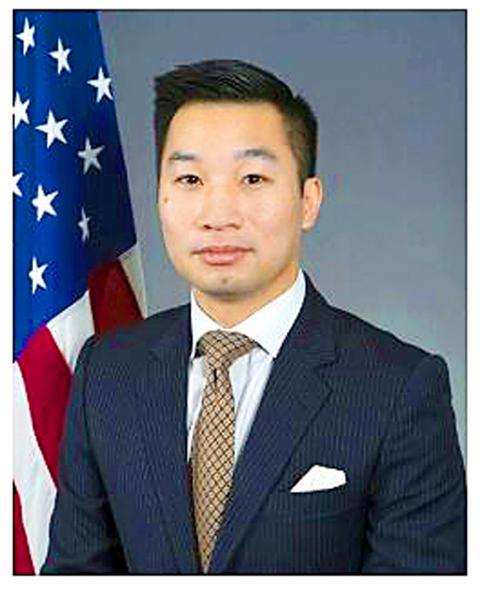A US Department of State official arrived in Taipei last night for a three-day visit, the first to arrive following the enactment of the US’ Taiwan Travel Act on Friday last week.
Alex Wong (黃之瀚), deputy assistant secretary at the Bureau of East Asian and Pacific Affairs, is scheduled to deliver remarks at the American Chamber of Commerce (AmCham) in Taipei’s annual Hsieh Nien Fan (謝年飯) banquet tonight, the American Institute in Taiwan (AIT) said in a news release yesterday.
President Tsai Ing-wen (蔡英文) will also attend the AmCham banquet and deliver a speech.

Photo: screen grab from the US Department of State Web site
Wong is also scheduled to meet with Taiwanese official to discuss various issues connected to Taiwan-US relations, the AIT statement said.
AIT spokeswoman Sonia Urbom dismissed the idea of a link between Wong’s visit and the enactment of the Taiwan Travel Act — which encourages visits by high-level US and Taiwanese officials — saying the trip had been planned for some time.
Wong, a political appointee, took office on Dec. 11 last year. He previously served as foreign policy adviser and general counsel to US Senator Tom Cotton, a Republican.
He was foreign and legal policy director for former Massachusetts governor Mitt Romney’s 2012 presidential campaign, and worked as an adviser to the State Department’s Iraq Rule of Law office from 2007 to 2009.
Sources said Wong is in charge of US President Donald Trump’s Indo-Pacific initiatives.
The Ministry of Foreign Affairs issued a statement welcoming Wong, and said his visit would allow US government agencies to gain a better understanding of Taiwan’s political and economic development, as well as its defense and cross-strait policies.
“Wong’s visit not only underscores the friendship between Taipei and Washington, but is also conducive to deepening the two sides’ partnership,” the ministry said.
The ministry said they would also exchange opinions with Wong on the future development of Taiwan-US ties and the two nations’ cooperation in the Indo-Pacific region.

DAREDEVIL: Honnold said it had always been a dream of his to climb Taipei 101, while a Netflix producer said the skyscraper was ‘a real icon of this country’ US climber Alex Honnold yesterday took on Taiwan’s tallest building, becoming the first person to scale Taipei 101 without a rope, harness or safety net. Hundreds of spectators gathered at the base of the 101-story skyscraper to watch Honnold, 40, embark on his daredevil feat, which was also broadcast live on Netflix. Dressed in a red T-shirt and yellow custom-made climbing shoes, Honnold swiftly moved up the southeast face of the glass and steel building. At one point, he stepped onto a platform midway up to wave down at fans and onlookers who were taking photos. People watching from inside

A Vietnamese migrant worker yesterday won NT$12 million (US$379,627) on a Lunar New Year scratch card in Kaohsiung as part of Taiwan Lottery Co’s (台灣彩券) “NT$12 Million Grand Fortune” (1200萬大吉利) game. The man was the first top-prize winner of the new game launched on Jan. 6 to mark the Lunar New Year. Three Vietnamese migrant workers visited a Taiwan Lottery shop on Xinyue Street in Kaohsiung’s Gangshan District (崗山), a store representative said. The player bought multiple tickets and, after winning nothing, held the final lottery ticket in one hand and rubbed the store’s statue of the Maitreya Buddha’s belly with the other,

‘NATO-PLUS’: ‘Our strategic partners in the Indo-Pacific are facing increasing aggression by the Chinese Communist Party,’ US Representative Rob Wittman said The US House of Representatives on Monday released its version of the Consolidated Appropriations Act, which includes US$1.15 billion to support security cooperation with Taiwan. The omnibus act, covering US$1.2 trillion of spending, allocates US$1 billion for the Taiwan Security Cooperation Initiative, as well as US$150 million for the replacement of defense articles and reimbursement of defense services provided to Taiwan. The fund allocations were based on the US National Defense Authorization Act for fiscal 2026 that was passed by the US Congress last month and authorized up to US$1 billion to the US Defense Security Cooperation Agency in support of the

‘COMMITTED TO DETERRENCE’: Washington would stand by its allies, but it can only help as much as countries help themselves, Raymond Greene said The US is committed to deterrence in the first island chain, but it should not bear the burden alone, as “freedom is not free,” American Institute in Taiwan Director Raymond Greene said in a speech at the Institute for National Defense and Security Research’s “Strengthening Resilience: Defense as the Engine of Development” seminar in Taipei yesterday. In the speech, titled “Investing Together and a Secure and Prosperous Future,” Greene highlighted the contributions of US President Donald Trump’s administration to Taiwan’s defense efforts, including the establishment of supply chains for drones and autonomous systems, offers of security assistance and the expansion of